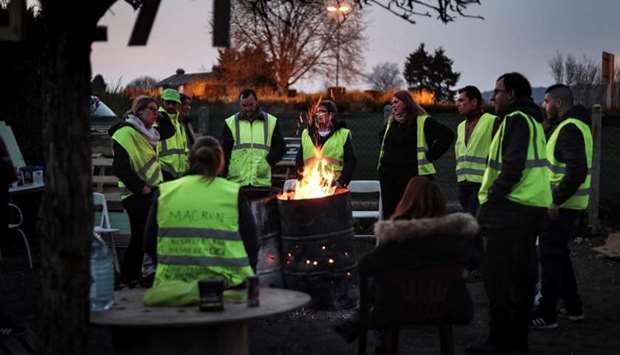The mayor of the French city of Bordeaux called for residents to remain indoors Saturday and for shopowners to shutter their stores as the authorities braced for another weekend of "yellow vest" violence.
Bordeaux, one of the bastions of the four-month-old anti-government protest movement, has, like Paris, seen repeated rioting and destruction of property during successive Saturday protests that draw thousands of people.The centre-right mayor of France's fifth-biggest city by population, Nicolas Florian, said he was "very worried" about this weekend's edition, the 20th since mid-November.
"We're told there will be hundreds of hooligans and people who are spoiling for a fight (with the police)," said Florian, who took over from his long-serving predecessor Alain Juppe on March 7.
"I'm asking shop owners to lower their shutters for protection and I'm asking the people of Bordeaux to stay home to allow the police do their work and not risk any accident," he told reporters.
In February and early March, the "yellow vest" movement had appeared to be losing steam, with the focus shifting to a series of town-hall style debates called by President Emmanuel Macron to try defuse anger.
But on May 16, it erupted again into major violence on the famed Champs-Elysees avenue in Paris, provoking calls for the government to put an end to the unrest.
Bordeaux police said they were preparing for similar scenes on Saturday and declared a large part of the south-western city centre off-limits to the protesters.
In Paris, too, the authorities banned demonstrations on the Champs-Elysees and in the vicinity of the presidential palace and National Assembly for a second week running.
Partial bans have also been proclaimed in Rouen in the north, Avignon in the south-east and Toulouse in the south-west.
The government drew fierce criticism over the March 16 riots in Paris, where more than 100 shops and restaurants were looted, torched or vandalised during hours of rioting the police appeared powerless to halt.
The Paris police chief was fired over the unrest and his successor ordered to take a "zero tolerance" approach.
Last week's protests -- which attracted 40,500 people nation-wide, according to police estimates -- down from 282,000 in mid-November -- were largely peaceful by comparison.
On Friday, one of the movement's key figures was fined 2,000 euros ($2,240) for organising two Paris protests without informing the authorities.
Eric Drouet, a 34-year-old truck driver who created a Facebook page that helped rally protesters last November, did not appear at his trial because of work obligations, said his lawyer, who announced he would appeal.
He has denied being one of the organisers of the leaderless, grassroots revolt.
Meanwhile, Macron continued to debate Friday with mayors gathered at the presidential palace, continuing a process that has seen him spend over 80 hours defending his policies in marathon debates since mid-January.
The former investment banker has promised to report back to the nation by mid-April on the outcome of the debates but has already discounted the kind of radical leftward shift sought by the demonstrators.
He has however made some concessions.
In December, he pledged 10 billion euros ($11.2 billion) in income top-ups and tax cuts for pensioners and low-paid workers, and cancelled the planned fuel tax hike that triggered the protests.
The "yellow vest" movement -- so-called after the protesters' high-visibility jackets -- began in rural France over fuel taxes but quickly grew into a broader wave of resistance to Macron's economic policies, seen by critics as tilted towards well-off city-dwellers.
The protests have been overshadowed by the violence of a minority of radical far-left and far-right demonstrators.
On Thursday, France's road safety department blamed a 17-percent spike in road deaths on the destruction by the yellow vests of hundreds of speed radars.
In February, 253 people died in road accidents in mainland France, 37 more than the same month a year ago.

